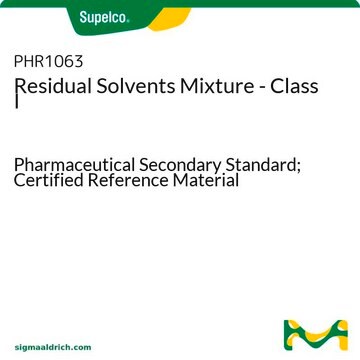PHR1068
Ethylenediaminetetraacetic acid disodium salt dihydrate
Pharmaceutical Secondary Standard; Certified Reference Material
Synonym(s):
Edetate Disodium, Edetate disodium dihydrate, Disodium ethylenediaminetetraacetate dihydrate, EDTA disodium salt, EDTA-Na2, Edathamil, Edetate disodium salt dihydrate, Sequestrene Na2
About This Item
Recommended Products
grade
certified reference material
pharmaceutical secondary standard
Quality Level
Agency
traceable to Ph. Eur. D2900000
traceable to USP 1233009
API family
edta
CofA
current certificate can be downloaded
technique(s)
HPLC: suitable
gas chromatography (GC): suitable
mp
248 °C (dec.) (lit.)
application(s)
pharmaceutical (small molecule)
format
neat
storage temp.
2-30°C
SMILES string
O.O.O.O.[Na+].[Na+].[Na+].[Na+].OC(=O)CN(CCN(CC([O-])=O)CC([O-])=O)CC(O)=O.OC(=O)CN(CCN(CC(O)=O)CC([O-])=O)CC([O-])=O
InChI
1S/C10H16N2O8.2Na.2H2O/c13-7(14)3-11(4-8(15)16)1-2-12(5-9(17)18)6-10(19)20;;;;/h1-6H2,(H,13,14)(H,15,16)(H,17,18)(H,19,20);;;2*1H2/q;2*+1;;/p-2
InChI key
OVBJJZOQPCKUOR-UHFFFAOYSA-L
Looking for similar products? Visit Product Comparison Guide
General description
Application
Analysis Note
Other Notes
Footnote
Recommended products
related product
Signal Word
Warning
Hazard Statements
Precautionary Statements
Hazard Classifications
Acute Tox. 4 Inhalation - STOT RE 2 Inhalation
Target Organs
Respiratory Tract
Storage Class Code
11 - Combustible Solids
WGK
WGK 2
Flash Point(F)
Not applicable
Flash Point(C)
Not applicable
Regulatory Listings
Regulatory Listings are mainly provided for chemical products. Only limited information can be provided here for non-chemical products. No entry means none of the components are listed. It is the user’s obligation to ensure the safe and legal use of the product.
PRTR
Class I Designated Chemical Substances
JAN Code
PHR1068-1G-BULK:
80333-1G-BULK:
PHR1068-1G:
PHR1068-1G-PW:
80333-1G:
Choose from one of the most recent versions:
Certificates of Analysis (COA)
Sorry, we don't have COAs for this product available online at this time.
If you need assistance, please contact Customer Support.
Already Own This Product?
Find documentation for the products that you have recently purchased in the Document Library.
Customers Also Viewed
Our team of scientists has experience in all areas of research including Life Science, Material Science, Chemical Synthesis, Chromatography, Analytical and many others.
Contact Technical Service







